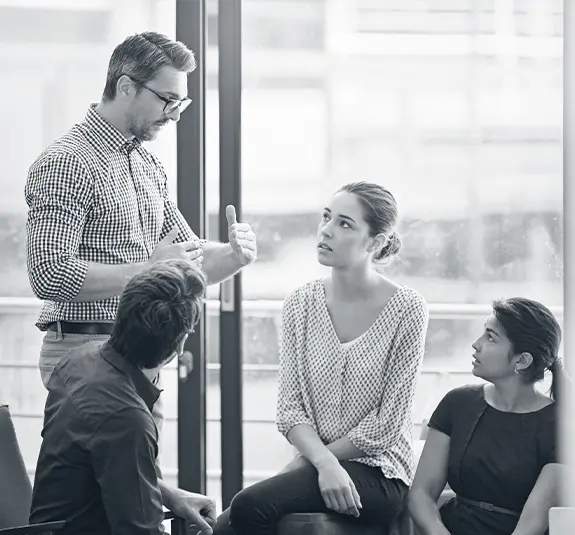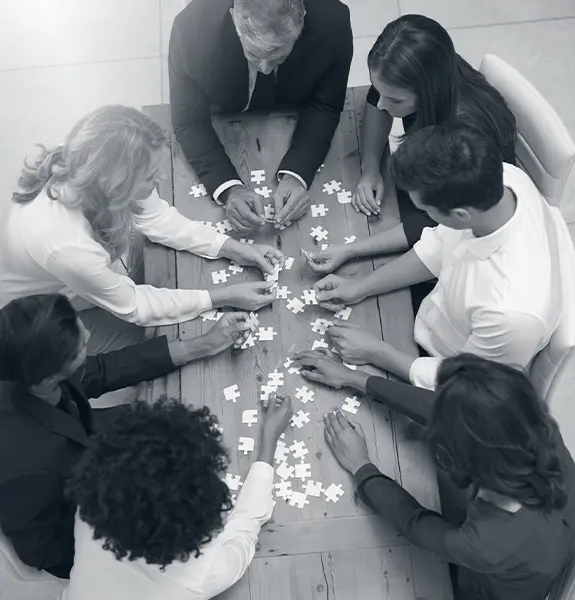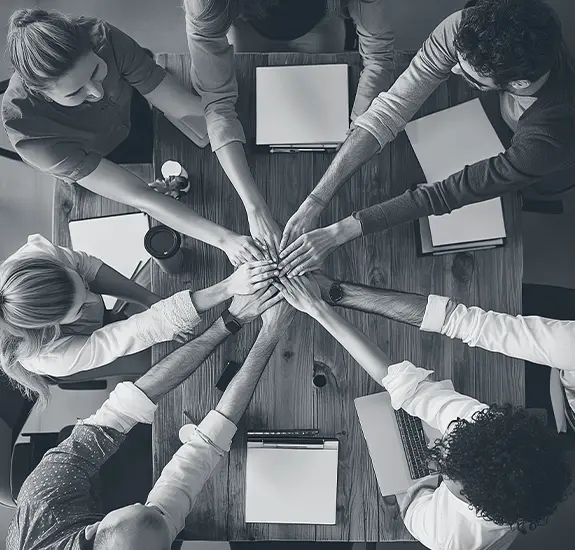Leadership & Team Effectiveness
Strengthening everyday leadership and team relationships,
so your organization can handle conflict, change, and growth with more confidence.
Overview
Organizations struggle to work effectively with the people who matter most – internal teams, employees, community members, customers, or the public. Often the problem isn’t obvious, and one-size-fits-all solutions don’t work. We start by understanding what’s actually broken, then work with you to address the specific challenges through facilitation, coaching, conflict resolution, and training.
Our Leadership & Team Effectiveness consulting also connects with our Business Process Consulting & Optimization and Strategic Research & Organizational Assessment Consulting services, so people and organizational systems improve together.
CONFLICT RESOLUTION AND MEDIATION
Our approach focuses on understanding underlying concerns rather than just surface-level positions. We work with all parties to communicate based on evidence and shared interests rather than assumptions about what others want or believe. As part of our Leadership & Team Effectiveness work, the goal is not just to resolve the immediate conflict but to leave the organization better equipped to handle future disagreements productively and support long-term organizational stability.


EXECUTIVE AND LEADERSHIP COACHING
We coach leaders one-on-one through difficult situations they’re facing. This includes managing teams or stakeholders who are different from them – whether those differences are cultural, generational, professional, or personal. Leaders often struggle to motivate and communicate effectively with people whose backgrounds and perspectives differ from their own.
We work with leaders navigating organizational politics where different constituencies have competing interests. We help improve decision-making processes when leaders feel overwhelmed by complexity or uncertainty. And we provide support through organizational crises where leaders need to maintain composure while guiding their organizations through difficulty. The coaching is practical and focused on specific challenges leaders face rather than abstract leadership theory.
COMMUNICATION TRAINING
Participants learn how to have difficult conversations productively – addressing conflict or performance issues directly while maintaining relationships. They develop skills for working with people different from them, recognizing how their own backgrounds and assumptions affect interactions. And they learn to communicate based on evidence rather than assumptions about what others are thinking or feeling. The training emphasizes actionable techniques participants can practice and refine over time.


STAKEHOLDER FACILITATION
When your organization needs to engage with external stakeholders – community members, customers, advocacy groups, or the public – we facilitate those conversations. This proves especially valuable when relationships are contentious or trust has broken down. We design and facilitate structured conversations that give all parties opportunity to be heard while moving toward productive outcomes.
Our facilitation focuses on understanding underlying concerns and finding common ground rather than just managing the loudness of different voices. We work with all parties to engage based on evidence about actual impacts and concerns rather than assumptions. The goal is not just to get through a difficult meeting but to repair relationships and establish better processes for ongoing engagement.
When facilitation supports complex decisions or multi-party engagement, we often combine this work with Strategic Research & Organizational Assessment Consulting to ensure decisions are grounded in evidence and aligned with organizational goals.
TEAM EFFECTIVENESS WORK
For teams that work together regularly, we facilitate discussions about how they collaborate and where friction emerges. We help them design working agreements and processes that account for how they actually operate rather than idealized teamwork that ignores real constraints.
For teams in crisis, we diagnose what’s actually wrong – often the surface problem isn’t the real issue – and facilitate discussions to address underlying dysfunction. This work is central to improving Leadership & Team Effectiveness across organizations of all sizes.


WHO NEEDS THIS SUPPORT
You might need our help if teams are stuck in conflict that’s preventing organizational progress. Leaders might struggle to communicate or motivate people who are different from them in background, perspective, or approach. Your organization might have damaged relationships with community members, customers, or the public that need repair. You might face difficult conversations or decisions that keep getting postponed because no one knows how to handle them productively. Or people in your organization need to work together more effectively but don’t know how to improve collaboration.
This work proves particularly relevant for organizations where communication across differences matters – whether those differences are internal diversity, external community engagement, or stakeholder relationships with competing interests.
WHAT YOU GAIN
Organizations working with us develop teams that can work together productively despite differences in background, perspective, or approach. Their leaders learn how to communicate and motivate diverse groups rather than only managing people similar to themselves. They resolve conflicts that were blocking organizational progress, freeing energy and attention for actual work. They improve relationships with communities, customers, or stakeholders where trust had broken down. And they gain skills and processes that prevent future communication breakdowns rather than just addressing current crises.
When appropriate, this work connects with AI Integration Consulting for Organizations to help teams adopt new technologies more smoothly and with less resistance.

Ready to strengthen your leadership and teams?
Get practical Leadership & Team Effectiveness support so your leaders, teams, and stakeholders can handle conflict, communicate clearly, and move work forward together.
REAL EXAMPLES
Case Study: Affordable Housing Development in Affluent Suburb
A mid-sized affluent city proposed building 85 units of mixed-income housing on a vacant parcel near downtown transit. The area had no existing affordable housing. The project quickly drew opposition from multiple directions: affluent neighbors citing traffic and “neighborhood character,” housing advocates pushing for deeper affordability, and community groups wanting tangible benefits like local hiring.
Public meetings had devolved into shouting matches. No one was listening – they were defending positions. The city convened a multi-stakeholder task force including neighborhood associations, housing nonprofits, faith and social-service leaders, and city planning staff. We facilitated the process over four months, moving through three structured phases: understanding concerns, exploring options, negotiating trade-offs.
Our sociological training was critical here. Rather than treating this as a simple negotiation, we understood it as competing groups with different forms of capital and power navigating shared space. Affluent neighbors had political influence but knew they couldn’t openly oppose affordable housing on discriminatory grounds. Housing advocates had moral authority but limited political leverage. Community groups represented future residents but weren’t yet at the table. Our role was creating a process where evidence and concrete trade-offs could replace symbolic battles.
The results: Affluent neighbors got design modifications (building height reduced, parking underground, traffic mitigation funded) and a permanent liaison committee for ongoing input. Housing advocates got deeper affordability (30% of units at 60% AMI, 10% at 40% AMI instead of 20% at 80%), extended affordability from 30 to 55 years, and nonprofit partners in project ownership. Community groups got local hiring commitments, dedicated community space, and small business support. The city met its housing mandates two years early and secured $6 million in state infrastructure grants.
Most importantly, the city adopted a new “Collaborative Development Framework” for all future affordable housing projects: early community design workshops, transparent impact assessments, community benefits agreements negotiated upfront, and a standing advisory board. This shifted engagement from reactive opposition to front-loaded collaboration, cutting average approval time from 24 months to 13 months.
The project demonstrated that affordable housing could be built in affluent neighborhoods without displacement or property devaluation when all stakeholders had voice, concrete concerns were addressed with evidence, and benefits were distributed rather than concentrated.
